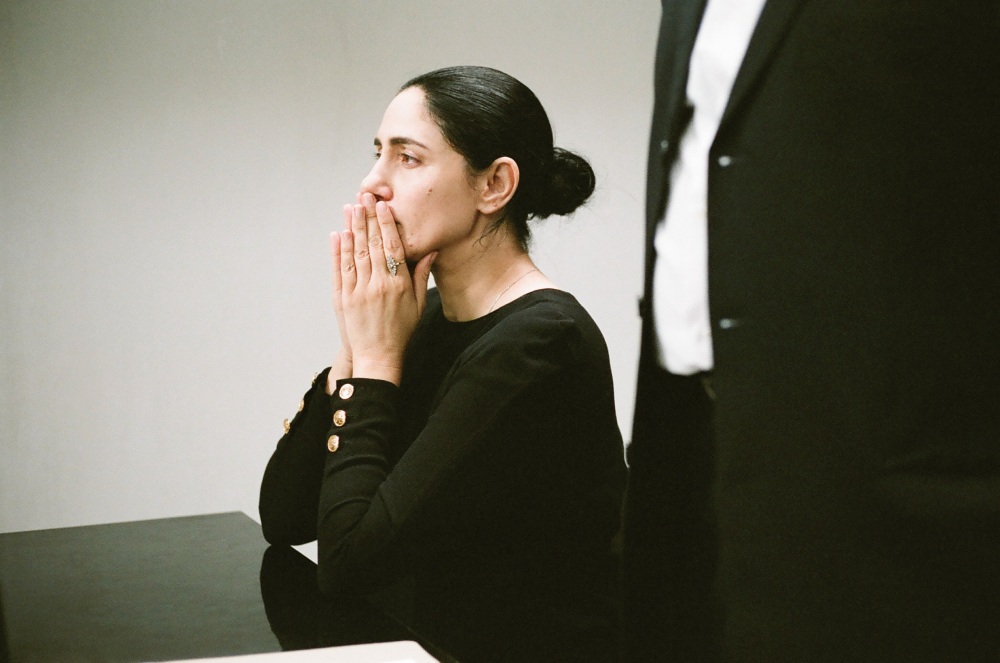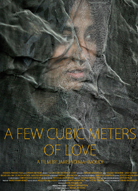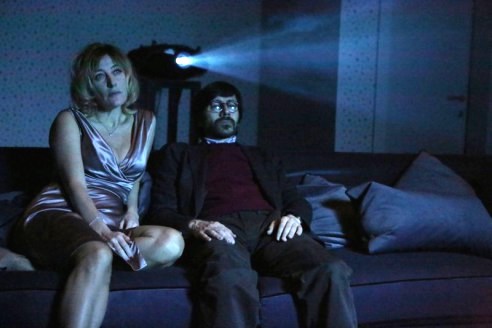Nathaniel's adventures in Toronto, the last leg.
I came out of my last screening a few hours ago and a plane awaits me tomorrow which is a good thing since I'm running on fumes. Four more films need writeups and we'll probably do a podcast. But we'll worry about this tomorrow. Tomorrow is another day. My TIFF screenings ended tonight. And get this: Less than 48 hours after my return to NYC, critics screenings for NYFF begin. I'm not even exaggerating. No rest at all for poor Nathaniel.
LMAO. Tweet of the Year! Okay, on to the movies...
Behavior (Cuba)
A huge hit in Cuba, and their probable Oscar submission if they submit at all (they often skip it), Behavior tackles tough topics like educational buerocracies, dead-end poverty, alcoholism, juvenile delinquency, prejudice against immigrants, you name it. More importantly it asks questions that have interested educators forever: how involved should a teacher be in the lives of her students? do you prepare them for life outside of school or merely provide them shelter from that life for a part of each day? Do you break the rules for one if you feel that child is a special case? Yet for all these heavy topics, provocative questions and the film's frequent classroom scenes, this drama never feels didactic or preachy but organically dramatized around its dimensional characterizations rather than characters as stand-ins for ideas/types (with a couple of exceptions). It's the story of an old passionate teacher Carmela (Alina Rodriguez), past retirement age, who is always at odds with the schoolboard because she's inflexible when it comes to bending rules to meet a student's needs. It's also the story of her class trouble-maker Chala (12 year old Armanda Valdez Friere in a frankly amazing debut), who the schoolboard wants to send to the Cuban equivalent of a juvie home. Chala is the sole breadwinner at home (through illegal means) and his mother drinks away the money rather than paying the bills. Carmela believes the kid has a good heart and continually demands disciplinary leeway at school.
 a moving story of teacher and student
a moving story of teacher and student
While many of the plot developments in Behavior are depressing and predictable, the movie is stubbornly hopeful, knowing the odds are against success but pressing on anyway. Writer director Ernesto Daranas, a fine new voice in Latin American cinema, makes sure this doesn't happen in a corny inspirational way, as in so many inferior teacher/student dramas do, but with roll up your sleeve grit in its narrative and smart visual choices - the camera is often exactly the right distance from the actors, to keep you fully aware of their tough environment and also their dreams. (Cue multiple shots of Chala on rooftops.) Behavior suggests that Carmela has saved a few students from their own lives, knows it, and will save as many more as she can manages before she dies... maybe even Chala. Her stubborn heroism? She knows that the broken system and these broken homes will long outlive her. B+
 Cub (Belgium)
Cub (Belgium)
I got dragged to this slasher movie by two friends who I hadn't seen in a long time. Spent the film with fingers carefully crossed over my eyes for watching / not watching simultaneously. A group of Cub Scouts are out for a camping weekend and they pick a spot much further into some spooky woods than they were intending, woods they're warned against but you know how people are in movies, they never turn back when warned. The Scouts three barely adult supervisors tell the young boys the tale of Kai a boy who becomes a deadly werewolf at night. It's a legend meant for campfire scares but we see Kai right away, not a werewolf but a boy their age with a creepy one horned mask who watches them from afar. He takes an interest in one of them, a loner named Sam (Maurice Luijten), the film's lead. Kai doesn't attack him but starts the bloodletting elsewhere. It's mildly entertaining but the characters aren't that well delineated and I predicted the finale about 75 minutes in advance. My friends thought the kills were imaginative and I will concur that two of them were, particularly a morbidly funny group kill. But ... GROSS.
"GROSS". That's actually my full sophisticated one-word review, and come to think of it my review for all slasher movies. I have come to understand and admire the broader horror genre after years of reading great critics enthusing about it, but this subgenre I'll never get - even when it comes with subtitles. C-

The Gate (France/Cambodia)
Like Labyrinth of Lies a few days back, The Gate benefits from a continually engaging true story. The new film from Regis Wargnier, who won the Oscar for the Catherine Deneuve epic Indochine, returns to that rich well of stories, French expatriates in countries they've colonized. The Gate, more appropriately titled Le temps des aveux in French, is based on the memoirs of a man named François Bizot (Raphaël Personnaez) who was arrested by the Khmer Rouge while he was innocently researching Buddhist traditions at monasteries. The communists believed this Frenchmen was a spy for America and the film becomes a battle of wits and test of humanity as Bizot and his captor Much (Phoeung Kompheak) argue and debate about Bizot's purpose in Cambodia and his fate. Like most good prisoner/captive dramas, their relationship is perversely intimate and the heart of the movie. Since its based on Bizot's memoirs, and the film begins near the ending, with Bizot returning to Cambodia we know he survives but things look bleak for a time and even when freed, the chaos isn't over since his wife and child are Cambodian/French and they don't have as much protection. Intense at times and surprisingly well acted -- most of the cast were non-actors aside from, of course, handsome French movie star Personnaez. B

The Farewell Party (Israel)
Israel's Oscars, "the Ophirs," have heartily embraced this dramedy about senior citizens who accidentally and after much prodding become crusaders for mercy killings of their terminally sick friends and spouses. It is far more tasteful than it sounds starting with heartbreaking decisions among longtime friends. But, curiously, the mood gets lighter and lighter in mood and the film funnier and funnier as it progresses. The comic highlight is a wonderfully cheeky display of solidarity when one of the friends is diagnosed with dementia but there are many little laughs along the way and each ensemble member finds a way to shine in a dialogue heavy film. It's a difficult film to describe, part drama about longterm love (both platonic and romantic), part ensemble black comedy, part agitprop about personal choice in matters of the end of life rather than machine-mandated life, and all parts delightful. It's not a done deal yet but it's easy to imagine this as Israel's Oscar submission and if submitted, an actual nominee in the Foreign Language Film category. B+
Also at TIFF:
A Little Chaos
The New Girlfriend
Wild
The Theory of Everything and Imitation Game
Foxcatcher and Song of the Sea
The Last Five Years
Wild Tales and A Pigeon Sat on a Branch Reflecting on Existence
Force Majeure, Life in a Fishbowl and Out of Nature
Mommy
The Kingdom of Dreams and Madness
Charlie's Country
 Monday, February 16, 2015 at 10:39AM
Monday, February 16, 2015 at 10:39AM  Jose here. In Gett: The Trial of Viviane Amsalem, Israeli goddess Ronit Elkabetz returns to play a part she’s lived with for more than a decade. In 2004, Ronit and her brother Shlomi teamed up as writers and co-directors of a film trilogy that would concentrate on the experiences of a woman as seen through the roles society imposed on her. In the first installment, To Take a Wife, Viviane must deal with being trapped in a loveless marriage to her husband Elisha (Simon Abkarian), in 7 Days, Viviane must sit Shiva and come to terms with the fact that she is obligated to mourn despite not feeling pain. In Gett, which opened this weekend on the heels of its Golden Globe Foreign Film nomination (Oscar passed it by), Viviane is trying to gain her freedom from Elisha, but finds that practically impossible given that her husband hasn’t committed any “sins” against her; her request is deemed invalid by the strict rabbinical court.
Jose here. In Gett: The Trial of Viviane Amsalem, Israeli goddess Ronit Elkabetz returns to play a part she’s lived with for more than a decade. In 2004, Ronit and her brother Shlomi teamed up as writers and co-directors of a film trilogy that would concentrate on the experiences of a woman as seen through the roles society imposed on her. In the first installment, To Take a Wife, Viviane must deal with being trapped in a loveless marriage to her husband Elisha (Simon Abkarian), in 7 Days, Viviane must sit Shiva and come to terms with the fact that she is obligated to mourn despite not feeling pain. In Gett, which opened this weekend on the heels of its Golden Globe Foreign Film nomination (Oscar passed it by), Viviane is trying to gain her freedom from Elisha, but finds that practically impossible given that her husband hasn’t committed any “sins” against her; her request is deemed invalid by the strict rabbinical court.











